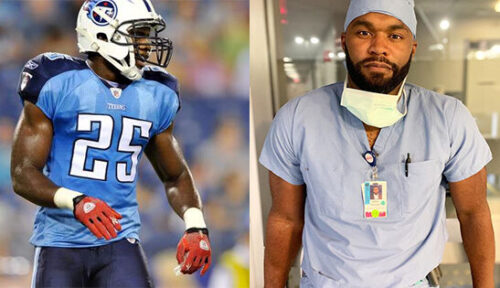Myron Rolle, a Rhodes Scholar and graduate of Florida State University’s medical school, began his residency at Massachusetts General Hospital three years ago in the neurosurgery department. Now, he and his fellow residents are working triage on the improvised COVID-19 floor at the hospital, serving a metro area under siege by the pandemic. The lessons from his days playing football at Florida State and in the NFL a decade earlier are coming in handy, he says.
“I remember playing against the University of Florida and having to change our scheme mid-game on the fly,’’ the 33-year-old Rolle, an all-conference safety at Florida State who played parts of three seasons with the NFL’s Titans and Steelers, told ESPN in late April.
“Right now, I am not doing brain surgeries as much as I typically would, or spine surgeries,’’ he continued. “The game change has happened, so we have to be flexible and adapt.’’
The change came in March, when Rolle and his fellow neurosurgery residents volunteered to help with the wave of coronavirus patients, despite his lack of training in the areas directly affected by the virus.
Rolle puts a familiar face on the pandemic response for many sports fans, who remember his stellar football career at Florida State from 2006 to 2008. He became even more of a household name in November of his final season when he interviewed for his Rhodes scholarship in Birmingham, then flew to College Park, Maryland, to play in his team’s game that night against Maryland.
Ironically, the flip side of his fame as an outstanding student-athlete came after his return from Oxford in 2010; interest from NFL teams dropped amid speculation that they doubted his commitment to football. Considered a first-round prospect two years earlier, he lasted until the sixth round.
His commitment today to his medical responsibilities is beyond doubt. When he spoke last month to ESPN—coincidentally, during this year’s draft—he made sure to remind the audience of what group the virus has harmed disproportionately.
“The health care disparity that we see in this country is sort of being further illuminated by this pandemic,’’ Rolle said, “based on the fact that a lot of these black and brown people are not able to social distance because they live in close quarters, or they don’t know if they have pre-existing conditions because the primary care physician is not affordable or accessible to them.
“So there’s lot of complexities and dimensions of this pandemic, and hopefully as public health care officials and politicians and other deal-makers and power brokers in this system, we can hope to get ahead of this.’’






